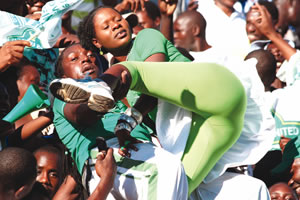Street life and sexuality issues
HIV and Aids Pandemic
Author: Watch Ruparanganda
Publisher: LAP Lambert Academic Publishing
Date: 2011
Pages: 303
ISBN: 978-3-8443-3080-9
By Memory Chirere
Watch Ruparanganda’s book, Genitals are Assets is an extremely thought provoking book which will make you want to laugh and cry at the same time.
It explores the sexual and economic relations among the street children of Harare, Zimbabwe in a language that is effortless and compelling.
This is a book both for serious academics and ordinary readers.
Underneath everything else, this book goes into important theoretical and methodological debates about power differentials between men and women in society
The author spent over 15 months on these Harare streets and the adjacent areas, slowly and carefully stalking, watching and listening to the street youths in order to understand their life styles and sexual behaviour and, also to get to their individual life stories.
In many of the interviews, the youths who live in the open become so free and familiar that they refer to the author as ‘Big dhara’, which is the Harare slang for boss.
The author chats to them as they “work”; as they relax on the pavements and as they hang around the bars and the restaurants.
They form a very deep sub-culture with a well developed and clever language.
For example, a street dweller is called “mugunduru” (one who sleeps anywhere, anyhow).
Sexually transmitted diseases are called “sikon’o”.
Men with lots of money are called “mhene”.
This is a ground-breaking book in that while much research and writing has been done before on survival strategies of street children in Zimbabwe by the likes of M Bourdillon, L Dube and Y Chirwa; little research had been done into exploring sexual encounters, dating, courtship and general romance conducted by street youths who are normally beyond the term child.
This book reads like a tragic-comedy, beginning with the origins of orphanage, destitution and street dwelling.
Consider this: A girl from Zvishavane gets to Masvingo and, during her second night at Mucheke bus terminus, two boys force themselves upon her.
She resists all night by locking up her legs until the early hours when she gets exhausted and succumbs.
When she flees to Harare, a fight ensues between two boys on who is to have her first.
They do not bother if she consents. But, as the boys are scrambling over her like that, an elderly destitute shoos them off, drags the girl behind the public toilet and the rest is history.
Even boys are not spared. One of them is sodomised at the age of 11 when he comes to live on the streets.
He is quite bitter that the boy who molested him dies before he revenges.
That culprit is swept away by stream waters during a heavy storm while sleeping in one of the city centre drainage canals.
It is clear to the author that sexual matters on the street are power issues.
The street girls offer sex to men from mainstream society and to some destitute men in exchange for money, food, clothing and protection.
They are not allowed to work or to openly associate with men other than those who “win” them and begin to act as their husbands.
But, these are tough “marriages” becau-se often, the men refuse to wear protection and are very brutal and uncompromising.
These youths who live in the fringes have some survival strategies too.
For instance, they believe that it is better to use herbs from the Mbare township and market to cure sexually transmitted diseases than to go to some public hospitals.
They have what are called street “pharmacies”.
Those who become very ill retire towards Mukuvisi River to rest, slow down and die, far away from the prying eyes of the public.
But, they also have various links with the bigger society because some bigger and more experienced boys are sometimes hired for sexual gratification by well-to-do lonely women in the leafy and affluent suburbs, whose spouses ignore them or have died of HIV and Aids, or some natural causes, or have gone to the Diaspora.
The youths are picked from designated points in the city at specific moments.
The boys receive money, beer, clothes and other goodies.
And those who seek pleasure from these people are from every class and race of society.
Maybe, the most exciting part of this book is the revelation that ritual sex has become rife in Harare.
Businessmen pay young boys to have sex with prostitutes in hotels and harvest sperm in condoms for ritual purposes.
Sperm is associated with regeneration of life and could be used to boost one’s business in terms of popularity, growth and profits.
On being asked why they consent to this, one street boy says: “Big Dhara, a ‘mugunduru’ is like a soldier. We are prepared for anything.”
Sometimes the street youths are taken to hotels in the avenues and are given new clothes in exchange of their old clothes with their sweat and dirt which are taken away for juju.
This is a very honest book which demonstrates the link between the sexual behaviour of street youths and the rest of society, and provides a sound justification for arguing that to adequately deal with the Aids epidemic and the question of street youths.
It is a book that all policy makers of the developing world need to read.
The author holds a Doctor of Philosophy in Social Sciences and is the Chairman of the Department of Sociology at the University of Zimbabwe where he is a lecturer.
His forthcoming book is called, Children with Adult Hearts, which is about child-headed households livelihoods.











Comments